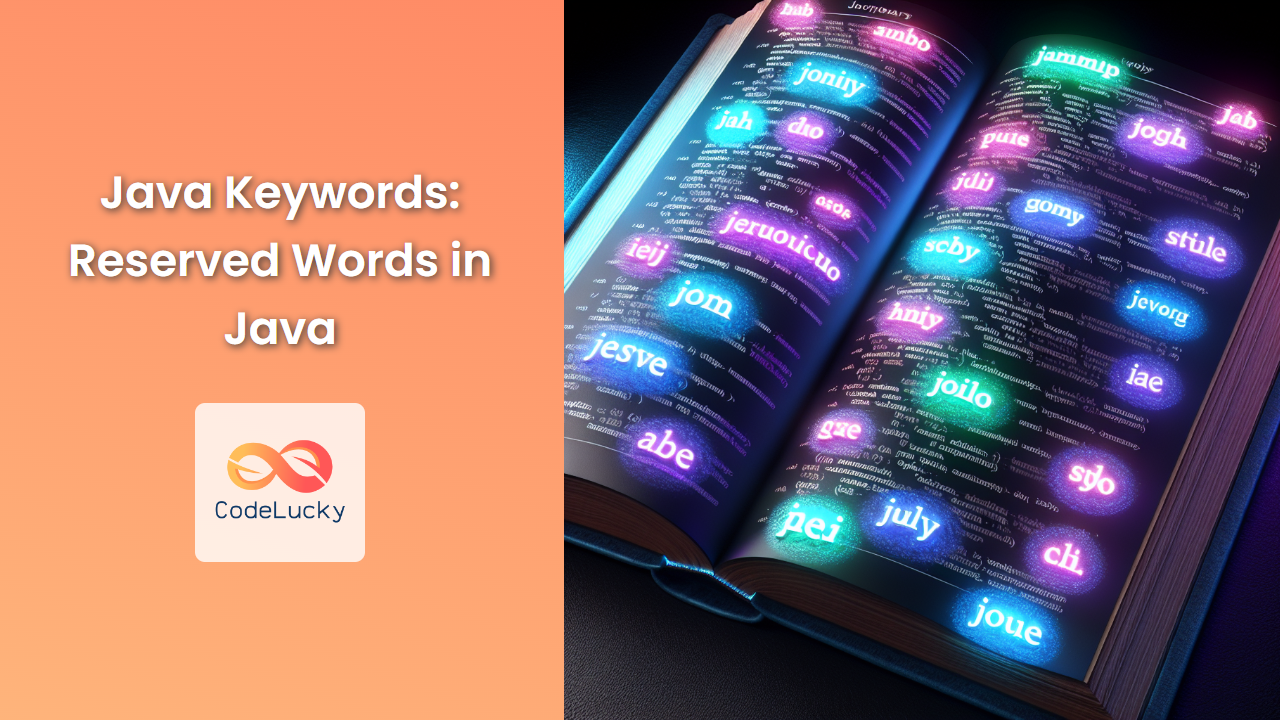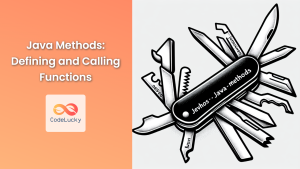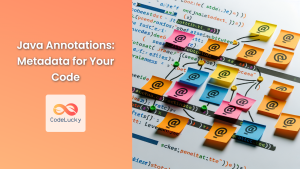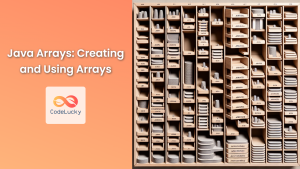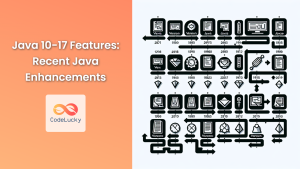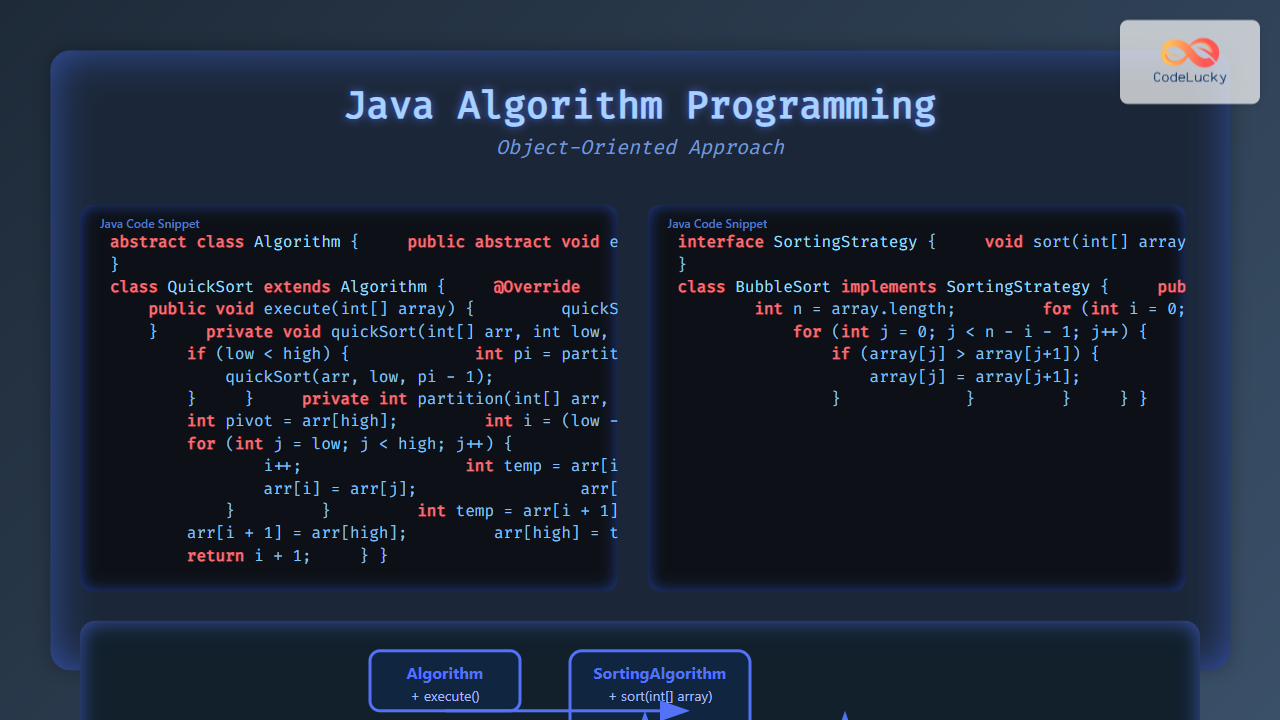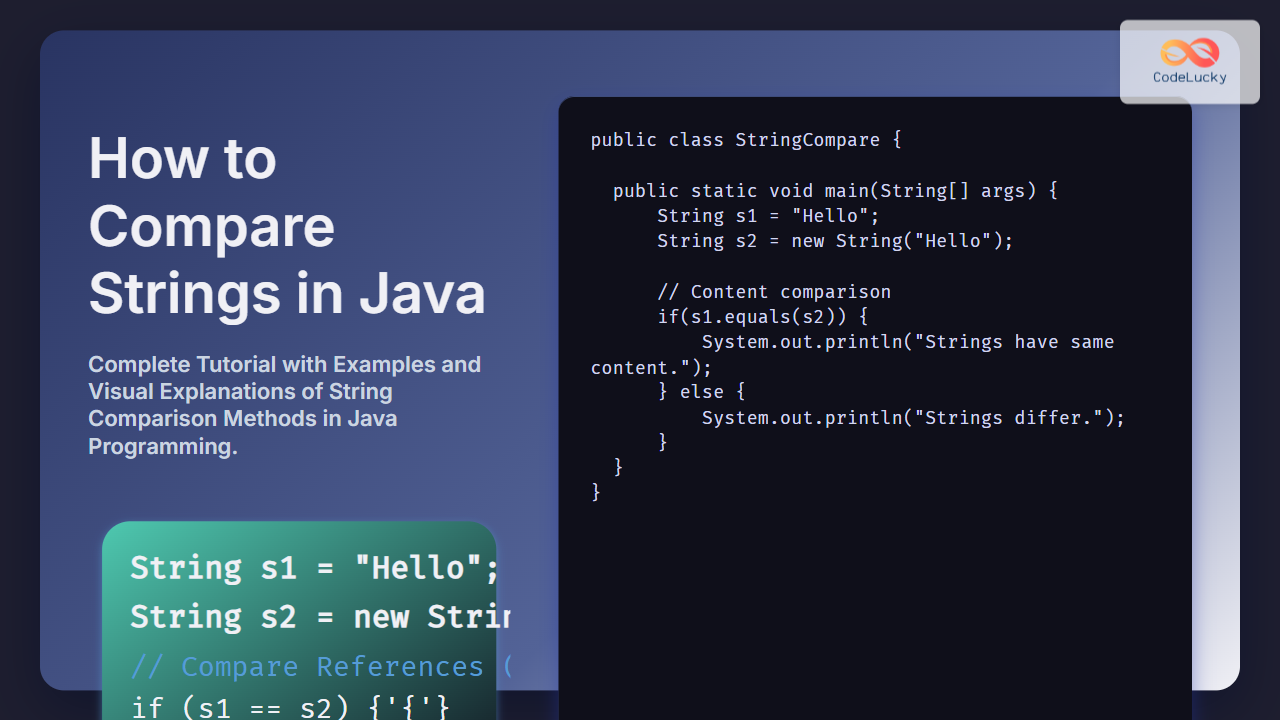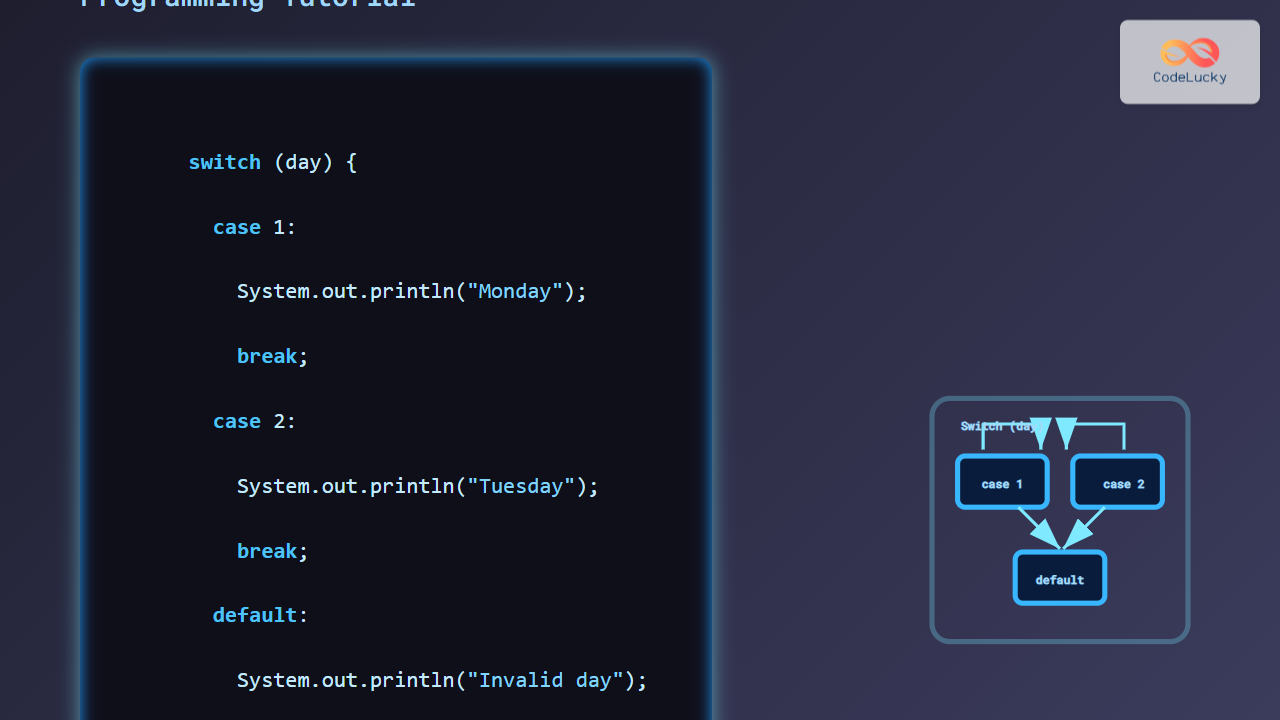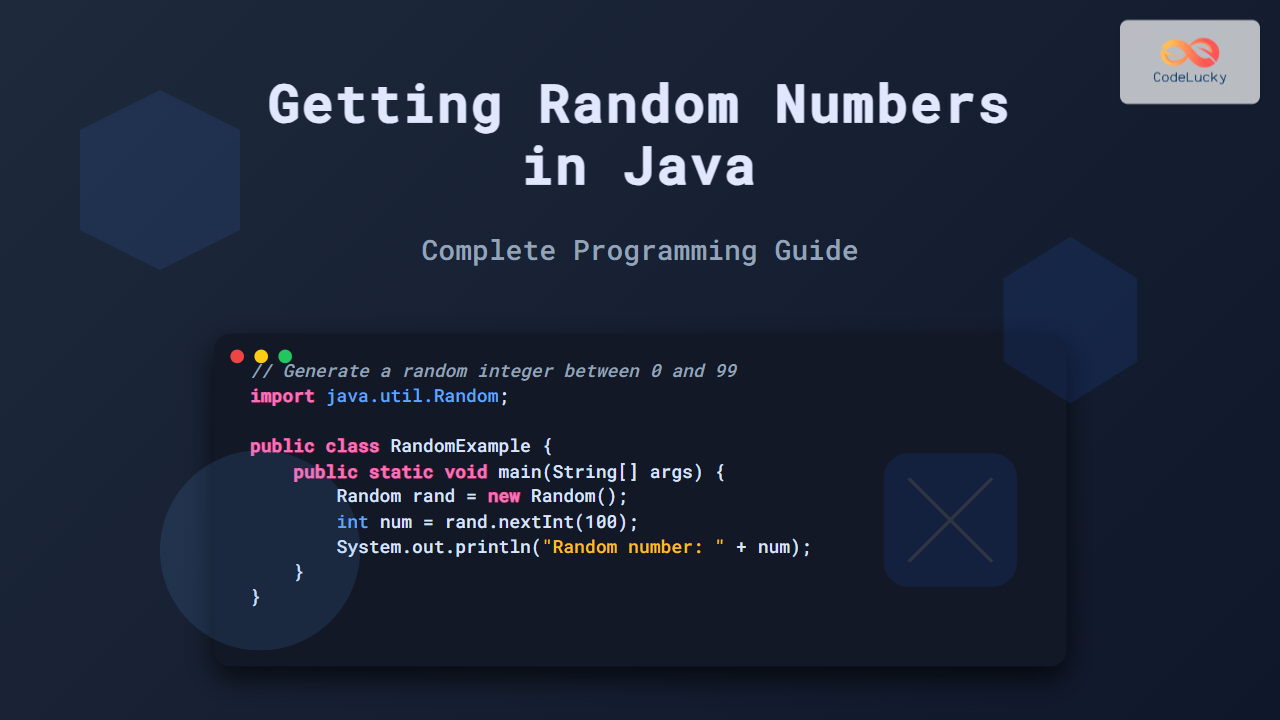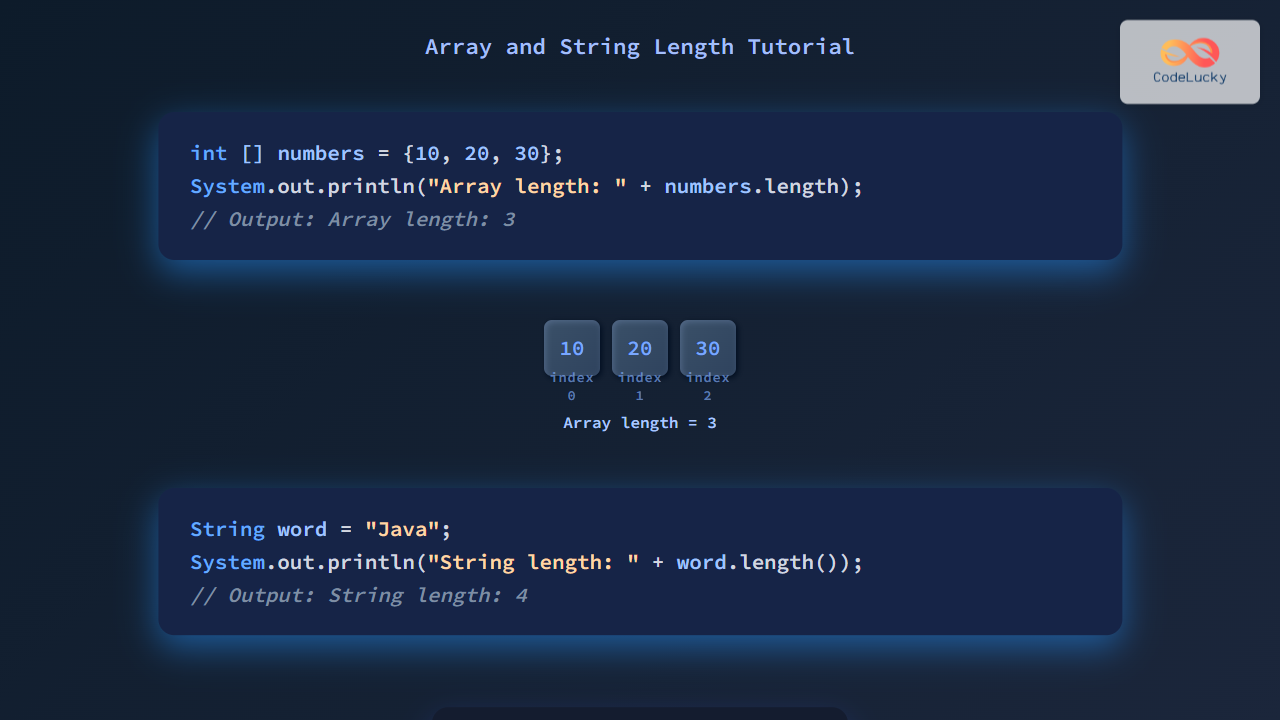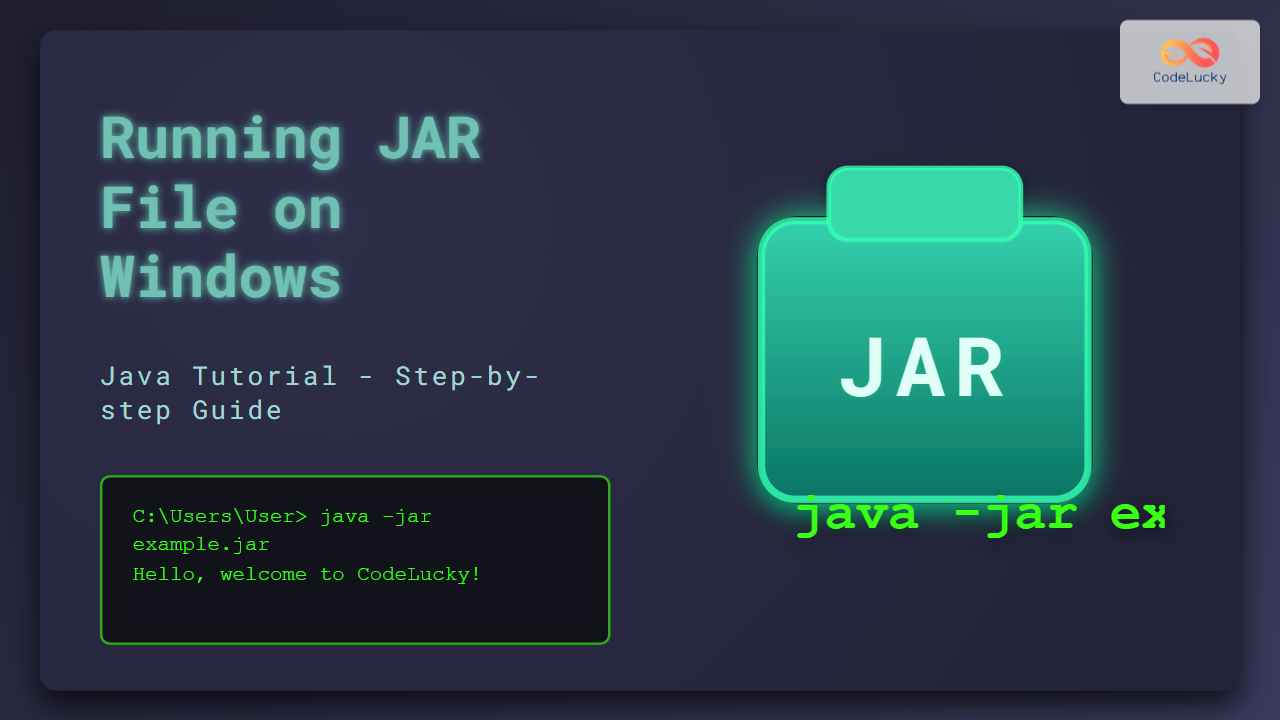Java, like many programming languages, has a set of reserved words known as keywords. These keywords are an integral part of the Java language syntax and cannot be used as identifiers (such as variable names, method names, or class names) in your Java programs. Understanding these keywords is crucial for writing correct and efficient Java code.
What are Java Keywords?
Java keywords are predefined, reserved words that have special meanings in the Java programming language. They are used to define the structure and behavior of Java programs. These words are an essential part of the Java syntax and are used to perform specific tasks such as declaring variables, defining control flow, and creating classes.
🔑 Key Point: Java keywords are case-sensitive and must be written in lowercase.
List of Java Keywords
Java has a total of 50 reserved keywords (as of Java 14). Let's categorize them based on their usage:
1. Access Modifiers
publicprivateprotected
These keywords control the visibility and accessibility of classes, methods, and variables.
public class MyClass {
private int myVariable;
protected void myMethod() {
// Method implementation
}
}
2. Class, Method, and Variable Modifiers
abstractclassextendsfinalimplementsinterfacenativenewstaticstrictfpsynchronizedtransientvolatile
These keywords are used to modify the declarations of classes, methods, and variables.
public abstract class Animal {
public abstract void makeSound();
}
public final class Dog extends Animal {
@Override
public void makeSound() {
System.out.println("Woof!");
}
}
3. Flow Control
breakcasecontinuedefaultdoelseforifinstanceofreturnswitchwhile
These keywords are used to control the flow of execution in Java programs.
for (int i = 0; i < 5; i++) {
if (i == 3) {
continue;
}
System.out.println(i);
}
4. Package Control
importpackage
These keywords are used to control the packaging and importing of classes.
package com.example.myproject;
import java.util.ArrayList;
5. Primitive Data Types
booleanbytechardoublefloatintlongshort
These keywords represent the primitive data types in Java.
int age = 25;
double salary = 50000.50;
boolean isEmployed = true;
6. Error Handling
catchfinallythrowthrowstry
These keywords are used for exception handling in Java.
try {
int result = 10 / 0;
} catch (ArithmeticException e) {
System.out.println("Cannot divide by zero");
} finally {
System.out.println("This block always executes");
}
7. Other Keywords
assertenumsuperthisvoid
These keywords serve various purposes in Java programming.
enum Day {
MONDAY, TUESDAY, WEDNESDAY, THURSDAY, FRIDAY, SATURDAY, SUNDAY
}
public class MyClass {
public void myMethod() {
assert(1 == 1);
System.out.println(this);
System.out.println(super.toString());
}
}
Reserved Words for Future Use
Java also has some reserved words that are not currently used but are reserved for potential future use:
constgoto
🚫 Warning: Although these words are not used in Java, you still cannot use them as identifiers in your code.
Practical Examples of Java Keywords in Action
Let's dive into some practical examples to see how these keywords are used in real Java code.
Example 1: Class and Method Declaration
public class Animal {
private String name;
public Animal(String name) {
this.name = name;
}
public void makeSound() {
System.out.println("The animal makes a sound");
}
}
public class Dog extends Animal {
public Dog(String name) {
super(name);
}
@Override
public void makeSound() {
System.out.println("The dog barks");
}
}
In this example, we use several keywords:
publicandprivatefor access controlclassto define classesextendsfor inheritancethisto refer to the current instancesuperto call the superclass constructorvoidto specify that a method doesn't return a value
Example 2: Control Flow
public class ControlFlowExample {
public static void main(String[] args) {
int[] numbers = {1, 2, 3, 4, 5};
for (int number : numbers) {
if (number % 2 == 0) {
System.out.println(number + " is even");
} else {
System.out.println(number + " is odd");
}
}
int i = 0;
while (i < numbers.length) {
if (numbers[i] == 3) {
System.out.println("Found 3!");
break;
}
i++;
}
}
}
This example demonstrates the use of:
forandwhileloopsifandelsefor conditional statementsbreakto exit a loop
Example 3: Exception Handling
public class ExceptionHandlingExample {
public static void main(String[] args) {
try {
int result = divide(10, 0);
System.out.println("Result: " + result);
} catch (ArithmeticException e) {
System.out.println("Error: " + e.getMessage());
} finally {
System.out.println("This block always executes");
}
}
public static int divide(int a, int b) throws ArithmeticException {
if (b == 0) {
throw new ArithmeticException("Cannot divide by zero");
}
return a / b;
}
}
This example shows the use of:
try,catch, andfinallyfor exception handlingthrowsto declare that a method may throw an exceptionthrowto explicitly throw an exception
Example 4: Interfaces and Abstract Classes
public interface Drawable {
void draw();
}
public abstract class Shape implements Drawable {
protected String color;
public Shape(String color) {
this.color = color;
}
public abstract double getArea();
}
public class Circle extends Shape {
private double radius;
public Circle(String color, double radius) {
super(color);
this.radius = radius;
}
@Override
public void draw() {
System.out.println("Drawing a " + color + " circle");
}
@Override
public double getArea() {
return Math.PI * radius * radius;
}
}
This example demonstrates:
interfaceto define a contractabstractclass and methodimplementsto implement an interfaceextendsfor inheritanceprotectedfor access control
The Importance of Keywords in Java
Understanding Java keywords is crucial for several reasons:
-
Syntax Correctness: Proper use of keywords ensures that your code is syntactically correct and can be compiled without errors.
-
Language Structure: Keywords define the structure of the Java language, including how classes, methods, and control structures are created and used.
-
Code Readability: Familiarity with keywords makes it easier to read and understand Java code, both your own and others'.
-
Avoiding Naming Conflicts: Knowing which words are reserved prevents you from accidentally using them as identifiers in your code.
-
Leveraging Language Features: Many keywords represent powerful features of the Java language. Understanding them allows you to fully utilize these features in your programs.
Best Practices for Using Java Keywords
To make the most of Java keywords and write clean, efficient code, consider these best practices:
-
Use Access Modifiers Wisely: Choose the appropriate access modifier (
public,private,protected) based on the intended visibility of your classes, methods, and variables. -
Leverage
finalfor Immutability: Use thefinalkeyword for variables that should not be changed after initialization, and for methods or classes that should not be overridden or extended. -
Utilize
staticAppropriately: Usestaticfor methods and variables that belong to the class rather than instances of the class. -
Handle Exceptions Properly: Use
try,catch, andfinallyblocks to handle exceptions gracefully and ensure proper resource management. -
Use
abstractandinterfacefor Design: Leverage abstract classes and interfaces to design flexible and extensible code structures. -
Be Cautious with
synchronized: Use thesynchronizedkeyword judiciously to avoid unnecessary performance overhead in multi-threaded applications. -
Understand the Implications of
volatile: Usevolatilefor variables that might be accessed by multiple threads concurrently. -
Use
instanceofSparingly: Whileinstanceofcan be useful, overuse can indicate poor design. Consider polymorphism as an alternative when appropriate.
Common Pitfalls and How to Avoid Them
When working with Java keywords, be aware of these common pitfalls:
-
Misusing
static: Overuse ofstaticcan lead to poor object-oriented design. Use it only when necessary.// Incorrect use public class MathOperations { public static int add(int a, int b) { return a + b; } } // Better approach public class MathOperations { public int add(int a, int b) { return a + b; } } -
Forgetting
breakinswitchStatements: This can lead to unexpected fall-through behavior.// Incorrect switch(day) { case "Monday": System.out.println("Start of the week"); case "Friday": System.out.println("End of the week"); default: System.out.println("Mid-week"); } // Correct switch(day) { case "Monday": System.out.println("Start of the week"); break; case "Friday": System.out.println("End of the week"); break; default: System.out.println("Mid-week"); } -
Overusing
throwsInstead of Handling Exceptions: This can lead to fragile code that doesn't handle errors gracefully.// Avoid this public void readFile() throws IOException { // Read file operations } // Better approach public void readFile() { try { // Read file operations } catch (IOException e) { // Handle the exception } } -
Misunderstanding
final: Remember thatfinalon a reference variable only means the reference can't be changed, not the object it points to.final List<String> list = new ArrayList<>(); list.add("Item"); // This is allowed // list = new ArrayList<>(); // This would cause a compilation error -
Incorrect Use of
abstract: Abstract classes should have at least one abstract method, otherwise consider using a regular class.// Incorrect use of abstract public abstract class Vehicle { public void start() { System.out.println("Vehicle started"); } } // Correct use of abstract public abstract class Vehicle { public abstract void start(); }
Advanced Concepts: Java Keywords in Action
Let's explore some advanced scenarios where Java keywords play a crucial role:
Multithreading with synchronized and volatile
public class Counter {
private volatile int count = 0;
public synchronized void increment() {
count++;
}
public int getCount() {
return count;
}
}
public class MultiThreadExample {
public static void main(String[] args) throws InterruptedException {
Counter counter = new Counter();
Thread t1 = new Thread(() -> {
for (int i = 0; i < 1000; i++) {
counter.increment();
}
});
Thread t2 = new Thread(() -> {
for (int i = 0; i < 1000; i++) {
counter.increment();
}
});
t1.start();
t2.start();
t1.join();
t2.join();
System.out.println("Final count: " + counter.getCount());
}
}
In this example:
synchronizedensures that only one thread can execute theincrement()method at a time.volatileensures that thecountvariable is always read from and written to main memory, preventing thread caching issues.
Generics with extends and super
public class Box<T> {
private T content;
public void set(T content) {
this.content = content;
}
public T get() {
return content;
}
}
public class NumberBox {
public static void addNumbers(Box<? extends Number> box) {
Number number = box.get();
System.out.println("Number: " + number);
}
public static void setInteger(Box<? super Integer> box) {
box.set(10);
}
public static void main(String[] args) {
Box<Integer> integerBox = new Box<>();
integerBox.set(5);
addNumbers(integerBox);
Box<Number> numberBox = new Box<>();
setInteger(numberBox);
System.out.println("Number in box: " + numberBox.get());
}
}
This example demonstrates:
- Use of generics with
extendsto allow any subclass ofNumber - Use of
superto allowIntegeror any of its superclasses
Enum with Abstract Method
public enum Operation {
PLUS {
public int apply(int x, int y) { return x + y; }
},
MINUS {
public int apply(int x, int y) { return x - y; }
},
TIMES {
public int apply(int x, int y) { return x * y; }
},
DIVIDE {
public int apply(int x, int y) { return x / y; }
};
public abstract int apply(int x, int y);
}
public class EnumExample {
public static void main(String[] args) {
System.out.println(Operation.PLUS.apply(3, 4)); // Outputs: 7
System.out.println(Operation.MINUS.apply(5, 2)); // Outputs: 3
System.out.println(Operation.TIMES.apply(3, 4)); // Outputs: 12
System.out.println(Operation.DIVIDE.apply(12, 3)); // Outputs: 4
}
}
This example shows:
- Use of
enumto define a set of constants - Implementation of an abstract method for each enum constant
Conclusion
Java keywords are the building blocks of the Java programming language. They provide the structure and functionality that make Java a powerful and versatile language. By understanding and correctly using these keywords, you can write more efficient, readable, and maintainable Java code.
Remember that while keywords are important, they are just one aspect of Java programming. To become a proficient Java developer, you should also focus on understanding object-oriented programming principles, design patterns, and best practices in software development.
As you continue your journey in Java programming, keep exploring and experimenting with these keywords in different contexts. This hands-on experience will deepen your understanding and help you write more effective Java code.
🌟 Pro Tip: Always refer to the official Java documentation for the most up-to-date information on Java keywords and their usage. The Java language continues to evolve, and new keywords or changes to existing ones may be introduced in future versions.
Happy coding, and may your Java journey be filled with exciting discoveries and successful projects!

